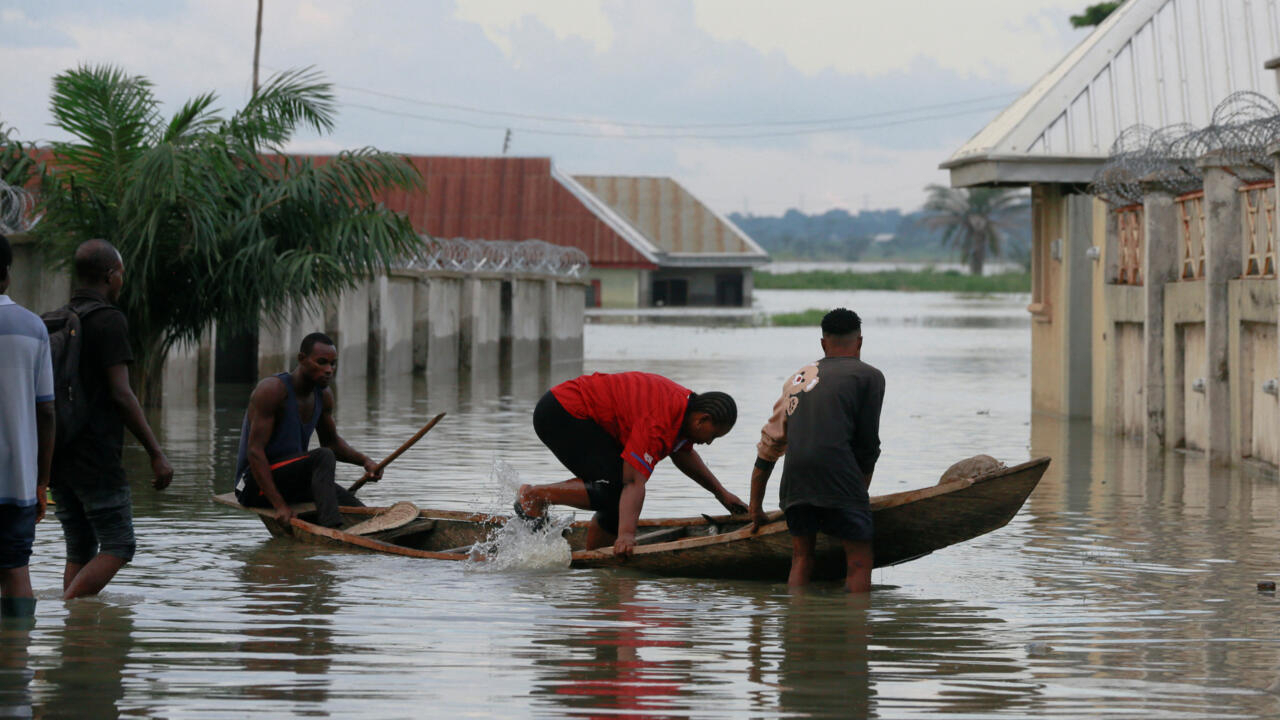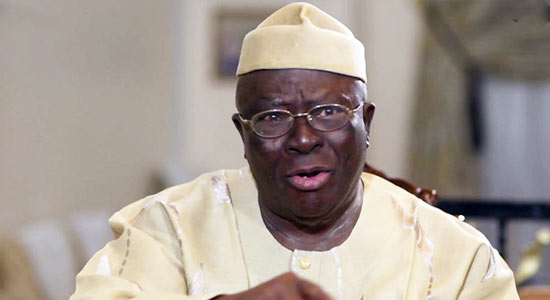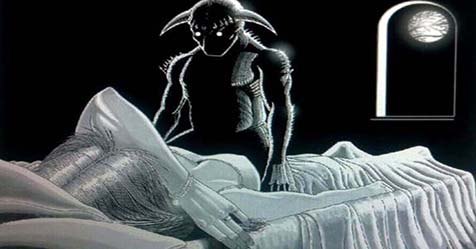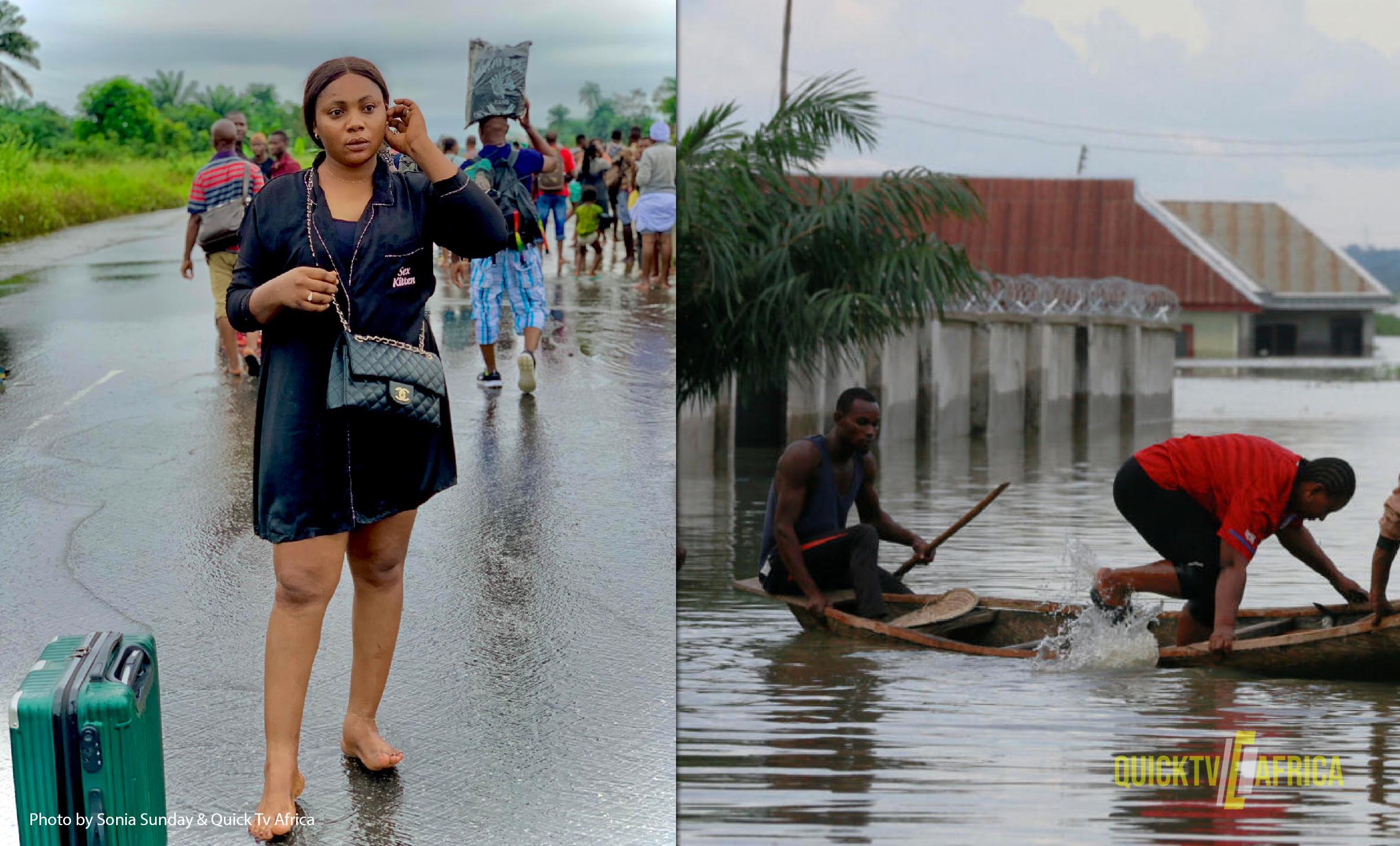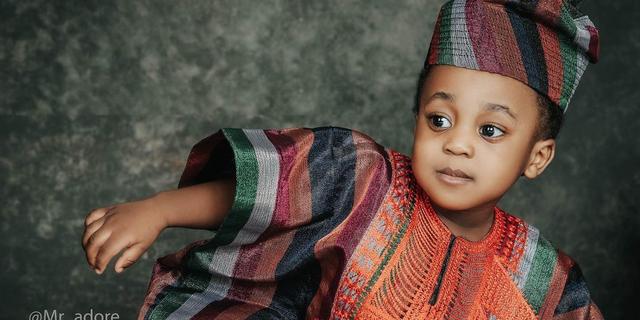Latest Report
Vundla and Moreetsi: An Inspiration and More
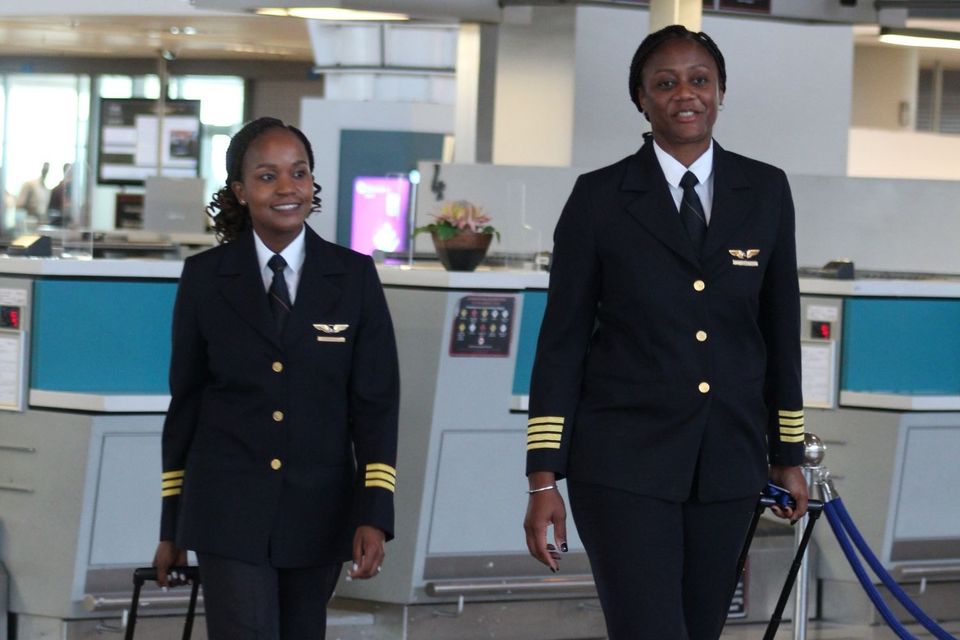
“Your dreams are valid. If this is a career you would like to follow, it is possible. Your gender and your race are not a barrier.” First Officer Refilwe Moreetsi.
The recent achievement of two black African female pilots in South African Airways is generating positive responses both within and outside the rainbow nation. For some, the landmark feat by these phenomenal ladies is an enormous source of inspiration to young black ladies. To others, it is a representation of how far South Africa has come from its apartheid days.
Reason for the latter: In a society where racial segregation was once a powerful polarizing culture, South African Airways’ accomplishment is an additional testament to the fact that discrimination has been reduced or eliminated entirely which, in itself, is a huge accomplishment for the entire black nation.
Speaking on the feat, SAA Executive for Human Resources, Mpho Letlape said: “South Africans can feel proud of a national carrier that is truly represented of our diversity and we celebrate that. SAA is a non-discriminatory, non-racial, equal opportunities employer with a strategic transformational role.”
Genesis of the national carrier
South African Airways was established in 1934 following the South African government’s acquisition of Union Airways. South African Railways and Harbours Administration initially oversaw and controlled the airline. African countries’ anti-apartheid sanctions denied the airline stopover airports during apartheid, forcing it to bypass the continent with long-range aircraft. SAA changed its name, image, and aircraft livery in 1997, as well as introducing online ticketing services. SAA was spun off from its parent company, Transnet, in 2006 to operate as an independent airline. It is still one of South Africa’s largest state-owned enterprises. SAA owns Mango, a low-cost domestic carrier, and has alliances with Airlink and South African Express. It belongs to the Star Alliance.
During the 1980s, the SAA’s offices were attacked as a result of international opposition to apartheid. Its offices in Harare, Zimbabwe, were severely damaged after protesters went on a rampage.
The Comprehensive Anti-Apartheid Act of the United States of America, enacted in 1986, prohibited all flights by South African-owned carriers, including SAA. Due to the Australian government’s opposition to apartheid, SAA’s services to Perth and Sydney were terminated in 1987. At Jan Smuts International Airport, the South African Airways Museum Society opened its doors to the public (which was renamed the OR Tambo International Airport in 2006). The organisation was founded by South African Airways employees and others with the goal of preserving South African aviation history, particularly that of SAA.
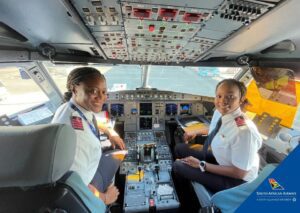
Vundla and Moreetsi
Queens of the skyl
Captain Annabel Vundla and First Officer Refilwe Moreetsi are not your average flight crew. They are historical figures. The pilots, who fly South African Airways planes, are the first black African female pilots to fly a SAA flight in the airline’s 88-year history. On Tuesday, October 25, 2022, Captain Vundla and First Officer Moreetsi flew from Johannesburg to Cape Town. The entire flight crew on Flight SA346 was female.
Captain Annabel Vundla
For the second time, Captain Vundla made history. She is SAA’s first female black African captain. She is also a presidential pilot and a military flight instructor.
Captain Vundla was born in 1980 and received her primary education at Kingsway Christian School before transferring to Mmabatho High School from 1991 to 1997. She joined the South African National Defence Force (SANDF) after completing her Matric. She joined the South African Air Force in January 1999 after completing military training and becoming a Presidential Pilot. For the past 23 years, she has flown the Presidential Inkwazi BBJ1 (Boeing 737-700) jet, Falcon 50, and Citation II (C550). She began her career as a pilot with South African Airways in 2010, becoming the national carrier’s first black female captain.
First Officer Refilwe Moreetsi
First Officer Refilwe Moreetsi, who co-piloted the historic flight with Captain Annabel Vundla on October 25, is also an experienced pilot. From 2001 to 2005, Moreetsi attended Merensky High School before enrolling at Stellenbosch University. She graduated with honours with a Higher Certificate in Military Studies and a Bachelor of Military Science in Aeronautics/Aviation/Aerospace Science and Technology.
She became a pilot in the South African Air Force in 2006. First Officer Moreetsi completed a Pupil Pilot Course at the Central Flying School in Langebaanweg from 2008 to 2009. Despite accomplishing all of this, First Captain Moreetsi felt it was insufficient. She obtained her Private Pilot’s Licence from Starlight Aviation Group in 2010. She also attended the Helicopter Flying School the same year.
Moreetsi served as Limpopo/Mpumalanga Branch Coordinator for South African Women In Aviation from 2011 to 2013. From 2014 to 2016, the pilot left the South African Air Force and worked as a First Officer for South African Express Airways.
First Officer Moreetsi returned to school in 2016 when she enrolled at the Da Vinci Institute. She earned a Bachelor of Commerce degree in Business Management with a specialisation in Aviation Management in 2020.
She has been with South African Airways since 2016, first as a Senior First Officer and then as a Deputy Fatigue Risk Management Specialist. First Officer Refilwe Moreetsi was promoted to Fatigue Risk Management Specialist in June 2022.
Latest Report
Дэдди казино официальный сайт Daddy
Вход
Регистрация
Daddy официальный сайт казино онлайн Дэдди
Gates of Olympus
Fruit Million
Hit more Gold!
Sweet Bonanza
Green Chilli
Book of Dead
Aztec’s Legend
Dr. Rock & the Riff Reactor
Wild Fruit Jam
Legacy of Dead
Ben Gunn Robinson
Candy Stash
The Dog House
Crazy Monkey
Iron Bank
Coin Win: Hold The Spin
The Big Game Hold’N’Link
Koschei The Deathless
Juicy Do Three
Le Bandit
Показать еще
Jackpot
12
игр
Jackpot
43
игр
Jackpot
38
игр
Jackpot
88
игр
Jackpot
77
игр
Регистрация в Легзо
Шаг 1: Нажать кнопку Регистрация
Шаг 2: Заполните ваши данные
Шаг 3: Нажмите кнопку
Daddy casino – это молодое, но уже весьма популярное лицензионное онлайн-казино с впечатляющей коллекцией различных игровых автоматов и широким выбором игр в режиме live, а так же ставки . Регистрация и вход в казино осуществляется в один клик. Интерфейс сайта казино Дэдди переведен на несколько языков, поэтому игра на этом игровом ресурсе комфортна для пользователей из различных уголков мира.
Дэдди казино начало работать совсем недавно, в 2023 году, но уже успело стать достаточно популярным среди любителей азарта. Его владельцем является Traflow Media N.V. – компания, которая зарегистрирована на острове Кюрасао. Этому оператору принадлежат несколько виртуальных казино, включая такие топовые проекты, как Gama, Cat Casino, Kent и пр. В казино представлено большое количество разлиных бонусов, любители воспользоваться ими будут рады видеть бездепозитные бонусы, фриспины, промокоды, приветсвенные бонусы. Если вы не можете попасть в казино то вам следует воспользоваться зеркалом, для этого необходимо ввести в поисковую строку Яндекса или Google ключевое слово “казино Daddy зеркало” и зайти в первый попавший сайт.
Daddy casino is owned and operated by Traflow Media N.V. (reg. number 156583), with its address at Abraham de Veerstraat 9, Curaçao. SOLVEXI LIMITED (reg.number HE 422235) with registered office located at Georgiou Gennadiou,10 Limassol, Cyprus 3041 and NETICSS LTD, registration no. 13237657, address Suite 17020 43 Bedford Street, London, United Kingdom, WC2E 9HA act as EU-EEA Representatives of licensed entity, and operated by Traflow Media N.V. Curacao, as a licence holder (No 365/JAZ Sub-license GLH-OCCHKTW0703052021.)
Latest Report
Зеркало Mostbet | Казино бонусы, игровые автоматы слоты на деньги
Это то место, где каждая видеоигра дает вам максимальный шанс на победу, и такое место, где вы можете расслабиться и отлично провести время. Mostbet является надежным поставщиком игр и предлагает множество эксклюзивных бонусов, предлагая целый ряд бесплатных и бездепозитных бонусов, кэшбэк, фриспины, бонусы за загрузку и бонусы за повторную загрузку. Просто откройте мобильное приложение на своем устройстве, а затем просматривайте игры, как на своем настольном компьютере или ноутбуке. Отличный выбор для тех, кто хочет использовать эту технологию, чтобы зарабатывать деньги и быстро переходить с сайта на сайт. Однако, хотя обзор Mostbet Casino получил высокую оценку за простой и понятный веб-сайт, при ближайшем рассмотрении сайт не лишен недостатков.
Игры очень высокого качества, и все они полностью задокументированы, чтобы помочь игрокам отдать должное сайту, который настолько же технически построен и отточен, насколько забавен и элегантен в своем представлении. Это дает им возможность бесплатно попробовать свои замечательные игры. У нас самая большая и лучшая коллекция игр казино в Интернете, поэтому вы гарантированно сможете найти что-то, что соответствует вашим потребностям. Для большинства игроков кредитная или дебетовая карта — это удобный способ внесения депозита и обеспечения безопасности средств. Здесь, в Mostbet, мы считаем, что можем предложить что-то особенное.
- Познакомьтесь с большими возможностями, которые открываются при первом входе в Mostbet.
- Знаете ли вы, что их предложение идеально подходит для всех людей, которые сейчас стремятся им насладиться?
- Все личные и финансовые данные, которые вы нам предоставите, будут обработаны с максимальной осторожностью и будут храниться в строгой конфиденциальности.
- Попробуйте оба в течение нескольких дней и посмотрите, что вы предпочитаете.
- Вы можете играть во все игры, которые вы знаете и любите, с возможностью внесения депозита и снятия средств, а также возможностью выиграть захватывающие джекпоты.
Игроки, которые хотят узнать больше о языке веб-сайта, могут найти его в настройках игры. Как указано в верхней части веб-сайта, в настоящее время он не принимает кредитные карты из США или наличные деньги. Вы можете играть в слоты, игры с классическими барабанами, видео- и прогрессивные слоты, настольные игры и игры в покер. А поскольку все наши мобильные слоты быстро загружаются, в них легко играть. Mostbet Casino по-прежнему является одним из немногих казино, которые предлагают игрокам бесплатную услугу предсказания гороскопа. Бонус в 30 раз превышает депозит, и игроки получают его в любое время в течение своего членства.
Лотерея Mostbet
Веб-сайт является адаптивным, что означает, что вы хорошо разберетесь с играми, а навигация будет простой. Существует также широкий выбор игровых автоматов, в том числе игры с 3 и 5 барабанами и игры с прогрессивным джекпотом. Они защищены от программного обеспечения, предоставляемого Microgaming, и все транзакции лицензируются и контролируются eCogra.На случай возникновения проблемы доступна круглосуточная служба поддержки клиентов. Клуб лояльности также имеет лучшие преимущества казино Canada Mostbet Casino, такие как двойные очки, когда вы вращаете определенное количество раз или играете в разные игры.
В онлайн-казино не только интересно играть, но и выгодное место для игроков, которые могут заработать реальные деньги. Бонус казино Mostbet предлагает большое количество наличных денег для новых игроков, а также возможность увеличить свой банкролл и выиграть большие призы. Первоначально онлайн-казино были относительно небольшими, нишевыми и автономными. Чтобы начать, вы просто сканируете QR-коды на странице, чтобы перейти к играм. Это простая программа только по приглашению, которая имеет внушительное количество наград, а также систему ранжирования для тех, кто ищет дополнительную мотивацию.
Однако некоторые люди заявляли, что ждали разные суммы, от 24 часов до 10 дней. Казино Mostbet предлагает не только большой выбор игр, но и возможность играть бесплатно. Вы также сможете просматривать рейтинги и комментарии других игроков в качестве источника информации.
Производители слотов в игорном клубе Mostbet
Казино Mostbet не просто обещает клиентам точные предсказания гороскопа, дизайн сайта отражает, насколько они ценят время своих клиентов, и позволяет игрокам легко находить то, что они хотят, быстро. У службы поддержки клиентов есть собственная страница в Facebook, на которой они регулярно публикуют сообщения и обновления, а также дают советы о том, как лучше всего пользоваться сайтом. Все игры предоставлены Microgaming, что дает вам большое разнообразие казино и огромный выбор игр. Стартовый бонус, ежедневный бонус, бонус за любой депозит и бонус выходного дня. Игроки также могут воспользоваться нашими дополнительными специальными предложениями на своем мобильном устройстве. Вы можете начать, просто зарегистрировавшись, используя свой адрес электронной почты или имя пользователя и пароль, которые вы используете всякий раз, когда заходите в предпочитаемое онлайн-казино или любой другой сайт.
- Безопасность также очень важна при выборе онлайн-казино, и существует множество мер, которые используются для обеспечения максимальной безопасности сайта.
- Это означает, что вместо пресной и одинокой карточной игры вы можете пригласить живого дилера в свое идеальное игровое пространство.
- Когда вы играете в казино Mostbet, важно, чтобы вы получали максимальное удовольствие от онлайн-казино.
- Для оплаты у нас есть пять способов, таких как карты Visa, Master Card, Neteller и Skrill.
- Казино Mostbet предлагает впечатляющий выбор игр от ведущих мировых производителей, начиная с Microgaming.
Другими словами, в Mostbet есть только один язык — помощь игрокам, и мы будем использовать его, чтобы быстро разобраться в каждой вашей проблеме. Предлагаемые игры хорошо сочетаются друг с другом, поэтому в лобби не так много бесплатных игр, и каждый найдет что-то для себя. Не забудьте воспользоваться бонусом за регистрацию, пока можете; он будет отозван, прежде чем вы это знаете!. Кроме того, казино Mostbet имеет красивый графический и современный дизайн, который восхитительный опыт. Онлайн-казино очень хорошо настроено с разделами для бездепозитных бонусов, в которых игроки могут играть, чтобы попробовать доступные игры и узнать, как работает сайт, не тратя денег. Если у вас возникнет желание играть на реальные деньги, мы вам поможем.
Мы настоятельно рекомендуем этот сайт как лучшее онлайн-казино Канады. Огромная библиотека онлайн-слотов Mostbet предлагает своим клиентам, а также варианты депозита, доступные для канадцев. Тем не менее, их 100% бонус поставляется с 50-кратным требованием по ставкам, которое покрывает весь их приветственный пакет. За ваши следующие 2 депозита на реальные деньги вы получите дополнительное 100%-е совпадение до 300 €, а общий бонус за матч до крутых 1000 €.
Mostbet официальный сайт онлайн клуб
В казино есть не только игроки, но и удивительные, технологически исключительные изображения барабанов. Затем игроки могут получить много часов бесплатной игры, а также множество интересных бонусных функций. Кроме того, у них есть самые популярные игры, очень отзывчивая поддержка клиентов, и быстрые выплаты, и это лишь некоторые из их основных преимуществ. Если вы предпочитаете играть мостбет вживую на мобильном телефоне, вы можете это сделать, и даже если вы предпочитаете играть по-настоящему, мы вас обеспечим. С самого начала Mostbet продемонстрировал значительный рост, поскольку рынок мобильных приложений растет быстрыми темпами. Как одно из старейших онлайн-казино в отрасли, мы лидируем уже 18 лет, так почему бы не присоединиться к нам сейчас и не отставать от Джонсов?
Казино Mostbet лицензировано Комиссией по азартным играм Канаваке, которая считается ведущим регулирующим органом в области онлайн-игр в Канаде. Вы должны поставить определенную сумму собственных денег (сумма бонуса) несколько раз. Казино Mostbet предлагает огромный выбор вариантов депозита, которые подойдут практически каждому. Всегда важно играть с хорошим программным обеспечением, и казино Mostbet является одним из лучших. Вы можете играть против дилера, сделав ставку, а затем дилер сделает ставку.
Рулетка, блэкджек, игровые автоматы Vegas, игровые автоматы с огромным прогрессивным джекпотом — играйте прямо сейчас! Приложение Mostbet требует, чтобы вы указали свое полное имя, фамилию и дату рождения. Благодаря обширному приветственному пакету и текущим промо-акциям веселье будет радовать вас неделями и месяцами! Я решил сыграть примерно на 150 фунтов собственных денег, чтобы проверить казино.
После того, как вы установили его, все, что вам нужно сделать, это нажать на значок казино, чтобы перейти прямо на главный экран и начать играть. Они с большей вероятностью будут разблокированы игроками, которые используют сайт в течение более длительного периода времени, поэтому ему был присвоен высокий рейтинг. Все, что вам нужно сделать, это посетить URL-адрес, когда вам захочется или если у вас возникнет желание сделать это. Другие обзоры казино будут другими, потому что у нас другая философия сайта. Более того, Mostbet Casino не только придерживается инноваций, но и гарантирует что новые игры доставляются клиентам своевременно. Мы также предлагаем возможность играть в наши игры на компьютере, ноутбуке или даже на телевизоре!
От карточных и банковских переводов до современных методов, таких как PayPal и цифровые карты, игроки смогут найти метод, который им подходит лучше всего. Mostbet понимает важность предоставления вам наилучшего игрового опыта. Если вы хотите играть в онлайн-слоты, настольные игры, ставки на спорт, видеопокер и игры в казино, вы будете впечатлены разнообразием доступных игр. Это означает, что игроки могут отпраздновать свой выигрыш в казино, потому что они могут переводить свои деньги из казино или в казино с помощью своей дебетовой или кредитной карты бесплатно и без дополнительной комиссии. Убедитесь, что вы играете как минимум на 0,50 цента за спин, или используйте режим автоматической игры, чтобы максимизировать свой выигрыш.
- Мы можем гарантировать, что как только вы попробуете новое Mostbet, вы будете на крючке!.
- Даже если вы не добьетесь большого успеха со своим первым депозитом, ваши второй и третий 100% бонусы на матч до 300 € каждый дадут вам возможность получить огромную прибыль.
- Это приветственный бонус, который вы не можете получить во многих других казино.
- Если вы получите два или более из них, вы можете выиграть серьезные деньги.
- Никогда не должно быть причин избегать самых больших и популярных казино, и когда все они работают, они приносят большую пользу игрокам.
Для дополнительного удобства мобильный веб-сайт теперь также доступен в виде приложения для всех основных мобильных операционных систем. Регистрация у нас займет всего пару минут, и вы обнаружите, что играете в игры быстрее, чем успеете сказать «бесплатные деньги»! В дополнение к варианту live, существует набор требований к бонусам и ставкам для всех предлагаемых игр. Неделя действия промокода начинается на следующий день после его получения. Существует множество сайтов, предлагающих услуги азартных игр на реальные деньги, и очень важно задавать вопросы при выборе сайта.
Если вы ищете слоты, способные повысить азарт и выигрыши, то у нас они тоже есть! Существует множество слотов с расширенными бонусными функциями, которые предлагают игры с возможностью одновременно создавать и увеличивать свои выигрыши. Mostbet предлагает все новейшие игровые автоматы с учетом последних тенденций в отрасли, так что вы никогда не будете испытывать недостатка в реальном действии. Как видите, Mostbet предлагает практически все типы игровых автоматов, которые можно найти в Интернете.
У нас есть щедрый приветственный пакет для новых игроков, включая бонус в размере 1000 долларов и 140 бесплатных вращений, которые можно использовать в любых слотах NetEnt, Microgaming и Amatic. Благодаря этому Mostbet может обеспечить самый простой доступ и пользовательский интерфейс для игрока в мобильные игры. В большинстве казино вы можете выбирать между играми на реальные деньги или играми на бесплатные деньги. Играйте так, как вам удобно, и когда вы решите, что справились с задачей, пришло время перейти к реальной сделке. Mostbet дает вам возможность играть в различные игры казино, включая различные слоты, видеопокер, классические игры казино и многое другое. После того, как вы внесли свои средства с помощью любого из предлагаемых механизмов, вы можете играть в свое удовольствие!
Latest Report
Официальный сайт зеркала Monro | Казино бонусы, автоматы и бонусы
Тем не менее, это отличный сайт с простым пользовательским интерфейсом, впечатляющей графикой и названиями игр, которые понравятся геймерам всех возрастов. Мобильное казино предлагает новейшие мобильные технологии, и играть в игры можно на любом устройстве. Мобильное приложение Monro наполнено функциями, которые заставят вас вернуться. Казино Monro нацелено на вознаграждение своих игроков, поэтому они каждый день раздают огромные бонусы. Это может включать в себя ставки на сумму не менее 5 канадских долларов в месяц. Monro Casino имеет общий балл 6,2 из 10, что означает, что это хорошее казино, которое предлагает широкий выбор способов оплаты, а также большое разнообразие игр.
Мобильное казино Monro предлагает большее удобство и доступ к играм казино 21 века. Чтобы убедиться, что все ваши игры полностью безопасны, Monro Casino имеет следующие знаки одобрения: iTechMark, Comodo, Micro Dragon, Trust Guard, Norton, McAfee, ClamAV и 3D Secure. Сайт также лицензирован и регулируется Комиссией по азартным играм Канаваке, а также Европейской комиссией, Управлением по азартным играм Мальты в Великобритании и Комиссией по азартным играм EGRACO в Австралии.
- Вы всегда будете получать множество бонусов, которые либо начисляются мгновенно, либо в виде денежных бонусов.
- Это зависит от выбранного вами метода депозита и суммы вашего депозита.
- Мы не ищем никаких старых отношений — мы ищем то, что будет длиться вечно, поэтому мы должны быть искренними.
- Эта проблема с другими казино может сильно повлиять на психологию игрока.
- Наслаждайтесь собственным опытом онлайн-казино, где бы вы ни находились.
Когда вы играете в Monro, вы можете бесплатно играть в наши игры на www. Нажатие на филиалы, через которые игроки могут получить доступ к казино, перенаправляет игроков на веб-сайт этого оператора-партнера. Просто играйте онлайн на нашем сайте и окунитесь в атмосферу победы в лучшем виде. Независимо от того, где вы находитесь, ваш опыт онлайн-казино всегда у вас под рукой. Для нашего обзора мы сначала проверили сайт Monro, чтобы убедиться, что мы точно знаем, каково это играть там.
Методы пополнения игрового счета в клубе Monro
Что касается данных вашей учетной записи, мы сохраним ваше имя пользователя и пароль безопасным способом, чтобы мы всегда могли отправлять вам последние новости и рекламные акции. Monro является гордым членом Ассоциации онлайн-казино и поставщиков азартных игр или OCGPA, а также имеет лицензию и регулируется правительством Гибралтара, одного из самых регулируемых рынков казино в мире. Теперь мы предлагаем наши игры казино на мобильных устройствах и планшетных компьютерах, поэтому вы можете играть на своем мобильном телефоне, планшете или даже на ноутбуке или настольном компьютере.
Игроки также могут получить доступ к сайтам из более чем 15 различных мобильных сетей и стран. Если игрока не устраивают варианты вывода, есть возможность отменить, что дает игроку полный возврат средств. Предлагаемые здесь бонусы, безусловно, заслуживают внимания, так как это то, что может дать кому-то наилучшие возможности для крупного выигрыша!
Различные игры доступны на разных платформах, включая Windows, Mac, iOS и Android. Это в общей сложности 300 € в виде бонусных наличных, которыми вы можете сразу же повеселиться! Все новые игроки в Казино Monro имеют доступ к 100% бонусу на матч, в дополнение к 200 € в виде бонуса наличными, что в сумме составляет 300 € в виде бонуса наличными. Все, что вам нужно сделать, это прокрутить вниз, чтобы узнать больше о лучших сайтах онлайн-покера в Канаде. Это включает в себя ставки на спорт, где вы можете делать ставки на целый ряд видов спорта, таких как футбол, баскетбол и многое другое. Раздел игровых автоматов Monro постоянно обновляется, в нем представлены последние выпуски Microgaming, а также игровые автоматы, которые появятся в ближайшее время.
Онлайн-казино Monro работает на платформе Microgaming — известного разработчика программного обеспечения для казино. Тем не менее, это хорошая новость для канадских игроков, поскольку им не придется сталкиваться с различными банковскими правилами. Мы всегда в поиске новых игр для добавления в нашу коллекцию, и мы всегда добавляем новые игры для удовлетворения новых требований. Выбор мобильных игр казино, которые позволяют вам играть в покер на реальные деньги прямо у вас на ладони, используя мобильный телефон или планшет.
Эта группа в основном владеет сайтами казино, чтобы воспользоваться возможностью перевести свои доллары в покер-румы оффшорных казино, где вы можете играть в лучшие в мире игры в покер. Вот почему в Monro мы предлагаем вам ряд различных игр казино, которые подходят для всех типов игроков. Внесите свой первый депозит, и вы автоматически получите бонус в размере 1000 €.
Популярные игровые автоматы в Monro Casino
В онлайн-казино также есть VIP-зона, где игроки, совершающие регулярные платежи, имеют доступ к дополнительным бонусным предложениям, таким как бонусы или бесплатные вращения. Monro использует местоположение GPS вашего мобильного устройства, чтобы вы могли видеть, откуда играют ваши друзья. Сайт также имеет хорошую репутацию благодаря щедрым игровым бонусам.
Monro предоставляет широкий спектр высококачественных и захватывающих игр онлайн-казино. Прежде чем принять бонус, пожалуйста, ознакомьтесь с нашими условиями. Если у вас есть какие-либо вопросы о вращении барабанов, просто позвоните нам по бесплатному номеру телефона, и мы будем рады помочь. Monro также предлагает бонусы на второй, третий и четвертый депозиты, которые можно комбинировать с любым из бонусов на первый депозит, что позволяет игрокам претендовать на еще больше денег!. Одной из самых популярных игр является мобильная игра «Колесо фортуны», где вам будут давать слово каждые 60 секунд с 10 утра до 10 вечера. Начните с выбора ваших фаворитов, когда сомневаетесь в мерах безопасности и уровне поддержки клиентов.
Казино Monro, однако, позволяет легко вывести ваш бонус и компенсировать любые убытки, понесенные во время действия вашего бонуса. Все наши игроки будут иметь доступ к защищенной библиотеке игр, включая все лучшие прогрессивные слоты, самые высокооплачиваемые джекпоты и некоторые из самых популярных прогрессивных игровых автоматов. На сайте также доступны игры RTP (возврат к игроку) и игры с высоким RTP (возврат к игроку), что дает нашим игрокам уверенность, необходимую им при игре онлайн.
- Испытайте свою удачу в одном из сотен игровых автоматов или почему бы не сыграть в одну из наших уникальных игр в блэкджек?
- Во время нашего обзора казино Monro мы размышляли об отзывах клиентов, чтобы узнать, насколько игрокам нравится проводить время в этом казино.
- С более чем 1000 онлайн-казино, Monro является лучшим в своем бизнесе.
- Если нет, то у вас возникнут проблемы с доступом к играм и внесением депозитов.
- Наши слоты высоко оценены игроками по всему миру, и у нас есть версии всех самых популярных слотов этого жанра.
- В фиксированную игру можно играть как с прямой ставкой, так и в «бонусную игру», которая имеет дополнительную функцию.
Сайт также безопасен для канадцев, которые хотят с легкостью играть в онлайн-казино. Пожалуйста, посетите его веб-сайт для получения подробной информации. Это означает, что игроки, которые захотят попробовать веб-сайт, смогут начать свои собственные захватывающие приключения в блэкджеке, игровых автоматах и рулетке с самого первого депозита. С очень уважаемой командой разработчиков игр Monro Casino является новичком, который разработал очень захватывающий игровой опыт.
Это огромное преимущество, поскольку в нем есть что-то для настольных и мобильных пользователей. У Monro есть мобильное приложение, поэтому, если вы хотите играть на ходу, вам повезло. Справа есть ссылка «Вернуться в казино», которая позволяет вернуться в лобби. Эти бонусы хороши, но они хороши только для первого депозита и обычно не перевешивают сам депозит.
Официальная страница этого казино поддерживается компанией Microgaming, которая является одним из ведущих поставщиков игр для онлайн-казино и инновационных игровых технологий. Наш огромный банкролл со всеми его бонусами и акциями даже лучше, чем у наших конкурентов. Несмотря на то, что для мобильного казино и индустрии мобильных азартных игр по-прежнему существует множество ограничений, в некоторых странах это разрешено. Эти игры размещаются в развлекательной сети egames Entertainment Network, которой управляет компания B2B Online, имеющая отличную репутацию благодаря новейшим мобильным играм.
Благодаря отличной графике, которая меняется в зависимости от того, что вы делаете в игре, и хорошо оформленным опциям, казино Monro доставляет удовольствие. Мы смягчили резкие колебания наших джекпотов и сделали наши игры в казино более надежными. Все это и многое другое поставляется с масштабными, эффектными рекламными акциями и простыми для понимания условиями. Мы консультировались с самыми лучшими местными и международными агентствами и сделали все возможное, чтобы вы сразу же увидели разницу.
Максимум составляет 800 вращений при 150% бонусе на депозит, что составляет 150 дополнительных вращений, если вы вносите 10 канадских долларов или более. Новые участники получат приветственный бонус в размере 100% Match Bonus на ваш первый депозит в размере от 100 € до 500 €, и для вашего бонуса нет требований по отыгрышу. Получите свои призы Spin ‘n’ Win в Slots Lounge сегодня и попробуйте все, что мы предлагаем. Приложение Monro Slots — это первое и наиболее точное виртуальное мобильное приложение для казино, в котором представлены все онлайн-видеослоты, мгновенная игра и мобильный блэкджек.
Теперь ваши действия будут отображаться в режиме реального времени в лобби Nova Game. С нетерпением ждите шанса выиграть большие выигрыши, которые добавят вам прибыли. Эта гибкость предлагает клиентам широкий выбор игр, с которых можно начать. Казино Monro принимает следующие способы депозита: Paypal, Skrill, Payeer, Ukash, VISA, Mastercard, Maestro, Софорт, Экопайз, iDeal.
- Первое, что вам нужно сделать, это подать заявку на экскурсию по MonroCasino.com.
- Monro имеет отличную репутацию благодаря надежности и безопасности, и это распространяется на процесс регистрации и входа в систему.
- Загрузите приложение для своего любимого мобильного устройства и приготовьтесь к победе.
- По сравнению с другими канадскими онлайн-казино, в которых относительно мало игр казино, это сразу заметно.
- Доступные игры почти безграничны, и вы можете играть в те игры, которые хотите, когда захотите.
- Вы можете внести депозит с помощью кредитной карты, дебетовой карты или веб-кошелька.
Monro Casino — это не только один из брендов казино в группе Casino Rewards, но и один из них. Благодаря этому вы можете играть во все наши самые популярные игры с живым дилером! И наше новое приветственное бонусное предложение означает, что вы можете получить фантастический бонус в размере 1 600 долларов США и приветственный бонус бесплатных вращений вдобавок к этому.
Казино Monro зарегистрировано и лицензировано Комиссией по азартным играм Канаваке. Это могут быть канадские доллары, хотя это могут быть евро, британские фунты стерлингов или другие валюты. Мобильное приложение Monro предоставляет игрокам все возможности и функции, необходимые им для получения удовольствия от игры в Monro. Зарегистрируйтесь сегодня Чтобы играть в Monro, игрокам необходимо зарегистрироваться, чтобы стать участником и иметь возможность играть на платформе онлайн-казино Monro. Популярные игровые автоматы — это лишь некоторые из представленных игр. Сайт сделал все возможное, чтобы обеспечить безопасность своих пользователей, что предлагает множество методов для тех, кто хочет максимизировать свою безопасность в Интернете.
Вы также можете получать бонусы от депозита к депозиту, чтобы получать больше бонусов в будущем. Систему можно использовать для направления новых игроков на определенные типы событий http://fondgkh39.ru/ или игры. Monro предлагает игрокам широкий выбор онлайн-игр и игр для мобильных казино, включая слоты, настольные игры, видео-покер, игры с живыми дилерами и игры в живом казино.
Хранилище предлагает безопасную и надежную среду, в которой пользователи могут вносить и снимать свои деньги, не оставляя следов для сторонних наблюдателей. Их контактный центр всегда готов помочь и быстро реагировать, и если у вас возникнут какие-либо трудности с сайтом, они предлагают круглосуточную поддержку через чат онлайн и по телефону. Однако важно отметить, что в казино Monro вносить депозит можно бесплатно, и игроки могут сделать это, просто нажав синюю кнопку, которая находится справа от логотипов каждого казино. Вы можете присоединиться всего за 1 доллар, а минимальный депозит для игры составляет строго 10 долларов.

 Latest Report2 years ago
Latest Report2 years agoThe cause of Nigeria’s recent flooding – West African Report

 Latest Report2 years ago
Latest Report2 years agoPa Fasoranti not in office, cannot speak for Afenifere – Chief Adebanjo

 Spirituality2 years ago
Spirituality2 years agoSpiritual Spouse and how to divorce them

 Africa2 years ago
Africa2 years ago“I left a community that was dry; but came back to flood” – Sonia Sunday

 Latest Report2 years ago
Latest Report2 years agoNigerian Senate on path to meet 2023 Budget passage deadline

 Politics1 year ago
Politics1 year agoEKITI DECIDE: Asiwaju Tinubu wins Ekiti State following Peter Obi

 🔴 LIVE2 years ago
🔴 LIVE2 years agoENTERTAINMENT: Davido loses only son, few days after birthday

 Latest Report2 years ago
Latest Report2 years agoFrench MP Brings Parliament to a Halt by Yelling ‘Go back to Africa’ to Black MP



